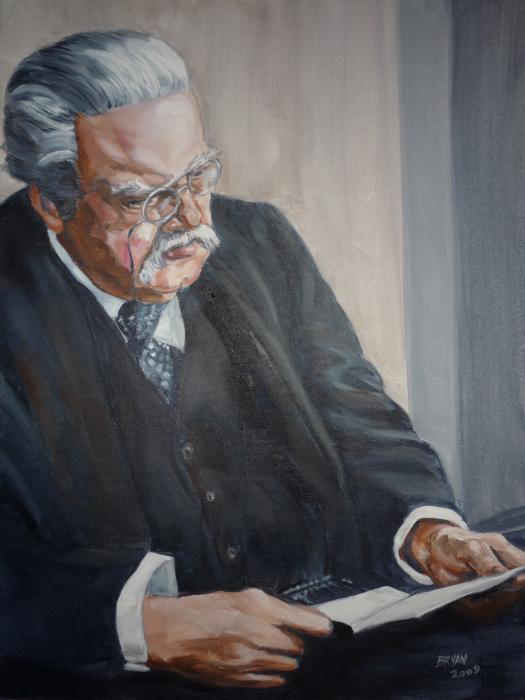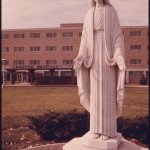Gilbert Keith Chesterton died on this day in 1936. A few years back, I had no idea about this fact for several reasons. A) I don’t know everything; B) he isn’t an official saint, so there is no feast day on the calender; C) he died long before I was born.
But I can truthfully say that one of the reasons why I am Catholic today is because of G.K. Chesterton.
You see, sometime between when I discovered Blaise Pascal and Thomas Merton, I came across Chesterton. Dale Ahlquist’s site was probably where I landed first. And then I hit the library.
Searching the catalog for his works, I was surprised to find that there wasn’t much that was written by Chesterton on the shelves. This is amazing because he was not only a prolific writer, but a great one as well. To be prolific and bad doesn’t guarantee that your work will stand the test of time. But to be prolific, good, and have trouble finding books written by that person? Well let’s just say that is baffling.
Conspiracy theories anyone?
Long time readers in this space won’t be surprised that I really enjoy Chesterton. Here you will find posts on his poems, his book Orthodoxy was the first YIMC Book Club selection, and generally I just appreciate his wit and wisdom. And how about Father Brown? And remember his argument with Mr. McCabe? Sheesh!
Back when Cardinal John Henry Newman was beatified, the hope for a cause for Chesterton rose precipitously. The excitement about that prospect has since leveled off, but Pope Francis is a Chestertonian, so don’t count it out.
The more folks who discover Chesterton’s books, the better. Why just yesterday I saw that David Sessions of Patrol has put up the first two posts of a “confront your prejudices” book club for Orthodoxy that you can follow along with. This may be interesting to follow, as I had the same idea about C.S. Lewis when I did the posts on Mere Christianity, back in the day. I just knew I’d hate that book, but as it it turns out, I didn’t.
Thanks to the folks over at Universalis, I found this charming little synopsis that I figured I would share with you too.
On this day in 1936 died G.K. Chesterton, writer and journalist. His writings – stories, essays, poems, books, journalism – are infused with an unequalled joy and love of truth.
In youth, he went through a crisis of nihilistic pessimism and it was his recovery from this that led him to God and ultimately to conversion. “The Devil made me a Catholic,” he said – meaning that it was the experience of evil and nothingness that convinced him of the goodness and sanity of the world and his creator. His poem “The Ballade of a Suicide” celebrates the salvific value of ordinary things; his novel, “The Man who was Thursday,” narrates the fight for sanity in an insane world and ponders the paradox of God; and “Orthodoxy”, written long before he became a Catholic, highlights orthodoxy not as a dead and static thing but as the only possible point of equilibrium between crazy heresies any one of which would drive us mad.
He took part in all the major controversies of his age, and was a lifelong adversary and friend of socialists and atheists such as George Bernard Shaw. These controversies were conducted with passion but with unfailing charity: he never sought to defeat his opponents, only to defeat their ideas. He would never cheat to score a point: and his love for the people he fought against is something that all controversialists should imitate, however hard it may be.
Read him, and pray for him.
You will be glad you did!
Thankfully, Chesterton’s works are experiencing a bit of a renaissance so you shouldn’t have much trouble finding something he has written that you can read. There are close to 40 books written by (and about him) available on the always open for business YIMCatholic Bookshelf. Before you head off to the stacks, enjoy this poem written about him by his pal Hilaire Belloc,
Lines to a Don
Remote and ineffectual Don
That dared attack my Chesterton,
With that poor weapon, half-impelled,
Unlearnt, unsteady, hardly held,
Unworthy for a tilt with men—
Your quavering and corroded pen;
Don poor at Bed and worse at Table,
Don pinched, Don starved, Don miserable;
Don stuttering, Don with roving eyes,
Don nervous, Don of crudities;
Don clerical, Don ordinary,
Don self-absorbed and solitary;
Don here-and-there, Don epileptic;
Don puffed and empty, Don dyspeptic;
Don middle-class, Don sycophantic,
Don dull, Don brutish, Don pedantic;
Don hypocritical, Don bad,
Don furtive, Don three-quarters mad;
Don (since a man must make an end),
Don that shall never be my friend.Don different from those regal Dons!
With hearts of gold and lungs of bronze,
Who shout and bang and roar and bawl
The Absolute across the hall,
Or sail in amply bellowing gown
Enormous through the Sacred Town,
Bearing from College to their homes
Deep cargoes of gigantic tomes;
Dons admirable! Dons of Might!
Uprising on my inward sight
Compact of ancient tales, and port
And sleep—and learning of a sort.
Dons English, worthy of the land;
Dons rooted; Dons that understand.
Good Dons perpetual that remain
A landmark, walling in the plain—
The horizon of my memories—
Like large and comfortable trees.Don very much apart from these,
Thou scapegoat Don, thou Don devoted,
Don to thine own damnation quoted,
Perplexed to find thy trivial name
Reared in my verse to lasting shame.
Don dreadful, rasping Don and wearing,
Repulsive Don—Don past all bearing.
Don of the cold and doubtful breath,
Don despicable, Don of death;
Don nasty, skimpy, silent, level;
Don evil; Don that serves the devil.
Don ugly—that makes fifty lines.
There is a Canon which confines
A Rhymed Octosyllabic Curse
If written in Iambic Verse
To fifty lines. I never cut;
I far prefer to end it—but
Believe me I shall soon return.
My fires are banked, yet still they burn
To write some more about the Don
That dared attack my Chesterton.
He has that kind of effect on his friends.












